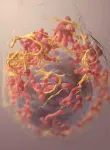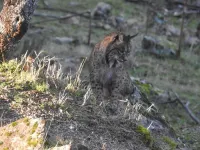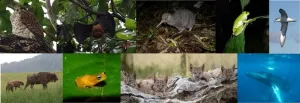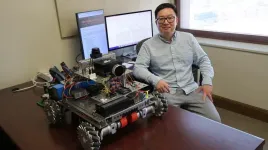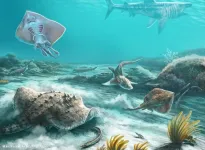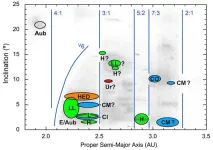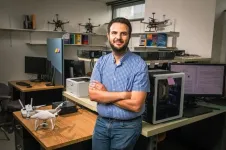(Press-News.org) It’s time for researchers to reconsider the current paradigm of cancer as a genetic disease, argued Sui Huang from the Institute for Systems Biology, USA, and colleagues in a new essay published March 18th in the open-access journal PLOS Biology.
The prevailing theory on the origin of cancer is that an otherwise normal cell accumulates genetic mutations that allow it to grow and reproduce unchecked. This paradigm has driven large-scale cancer genome sequencing projects, such as The Cancer Genome Atlas, to identify cancer-driving mutations and develop drugs designed to target aberrant proteins and pathways.
In their new essay, Huang and colleagues argue that this somatic mutation theory of cancer is unproductive. They point to inconsistencies in the sequencing data that contradict the current theory, including the fact that many cancers have no known driver mutations while some normal tissues can harbor cancer-causing mutations.
They propose a broader, more “holistic” view that embraces organismal biology and theory. Specifically, they encourage considering alternative paradigms that encompass non-genetic processes involved in tumorigenesis. For example, they explain the concepts of cancer as a result of disruptions in gene regulatory networks (Huang) — or of tissue organization, a theory that considers the disturbance of the field generated by neighboring cells and surrounding tissue (Soto-Sonnenschein). The authors argue that these alternative explanations will guide experiments to advance our understanding of the origins of cancer.
The authors add: “A full embrace of the idea that the origin of cancer lies beyond the realm of genetic mutations will open new vistas on cancer treatment and prevention. Accepting that not all carcinogens are mutagens will strengthen public health policies aimed to prevent exposure to environmental non-mutagenic factors that may promote cancer, such as food additives and plastics and many other toxicants that alter tissue homeostasis.”
In your coverage, please use this URL to provide access to the freely available paper in PLOS Biology: https://plos.io/4i5aERn
Citation: Huang S, Soto AM, Sonnenschein C (2025) The end of the genetic paradigm of cancer. PLoS Biol 23(3): e3003052. https://doi.org/10.1371/journal.pbio.3003052
Author countries: United States, France
Funding: see manuscript
END
Non-genetic theories of cancer address inconsistencies in current paradigm
A recent essay argues for re-considering cancer as a genetic disease
2025-03-18
ELSE PRESS RELEASES FROM THIS DATE:
Food and non-alcoholic drink products in Mexico were substantially reformulated to be healthier following the 2020 introduction of warning labels identifying products with excessive content of calorie
2025-03-18
Food and non-alcoholic drink products in Mexico were substantially reformulated to be healthier following the 2020 introduction of warning labels identifying products with excessive content of calories, fat, salt, sugar, sweetener and caffeine
In your coverage, please use this URL to provide access to the freely available paper in PLOS Medicine: http://journals.plos.org/plosmedicine/article?id=10.1371/journal.pmed.1004533
Article title: Product reformulation in non-alcoholic beverages and foods after the implementation ...
Conservation efforts are bringing species back from the brink, even as overall biodiversity falls
2025-03-18
A major review of over 67,000 animal species has found that while the natural world continues to face a biodiversity crisis, targeted conservation efforts are helping bring many species back from the brink of extinction.
The study draws on data from the IUCN Red List, the world’s largest database of species conservation status. The researchers say their results, reported in the journal PLOS Biology, highlight both the successes and the need for urgent action.
The world is facing a global biodiversity crisis, with 28% of more than 160,000 assessed species threatened with extinction, and an estimated one million species facing this fate due to human activities. ...
Conservation efforts analysis reveals which actions are most helpful for endangered species status
2025-03-18
Targeted conservation actions are essential to prevent wildlife extinctions, but more efforts are needed to fully recover biodiversity, according to a study published March 18th in the open-access journal PLOS Biology by Ashley Simkins of the University of Cambridge, UK and colleagues.
Out of over 166,000 species assessed by the International Union for Conservation of Nature, around 28% are threatened with extinction. Global efforts to prevent extinction and recover biodiversity have had some success, but there is limited data to show which conservation actions are most effective. In this study, Simkins and colleagues compile information ...
JSCAI special issue explores the transformative role of artificial intelligence in interventional cardiology
2025-03-18
WASHINGTON —The Journal of the Society for Cardiovascular Angiography & Interventions (JSCAI) proudly announces the publication of a groundbreaking special issue: The Role of Artificial Intelligence in Cardiovascular Interventions.
This issue explores how artificial intelligence (AI) is revolutionizing interventional cardiology, from diagnostic precision to procedural planning and patient outcomes. It features a collection of original research, reviews, and viewpoints that delve into AI’s applications across ...
Wayne State University research making strides in autonomous vehicle and machine systems to make them safer, more effective
2025-03-18
DETROIT — A grant to Wayne State University from the National Science Foundation (NSF) is opening new doors for researchers and students to explore the future of autonomous vehicles, machines and drones.
Zheng Dong, Ph.D., assistant professor of computer science in Wayne State’s School of Engineering, was awarded a five-year, $595,611 NSF grant for the project, "CAREER: ChronosDrive: Ensuring Timing Correctness in DNN-Driven Autonomous Vehicles with Accelerator-Enhanced Real-Time SoC Integration."
“We ...
Thorny skates come in snack and party sizes. After a century of guessing, scientists now know why.
2025-03-18
When Jeff Kneebone was a college student in 2002, his research involved a marine mystery that has stumped curious scientists for the last two decades. That mystery had to do with thorny skates in the North Atlantic. In some parts of their range, individuals of this species come in two distinct sizes, irrespective of sex, and no one could figure out why. At the time, neither could Kneebone.
In a new study, Kneebone and researchers from the Florida Museum of Natural History say they’ve finally found an answer. And it’s all thanks to COVID-19.
People have known about the size discrepancy in thorny skates for nearly a century, but it became critically ...
When did human language emerge?
2025-03-18
It is a deep question, from deep in our history: When did human language as we know it emerge? A new survey of genomic evidence suggests our unique language capacity was present at least 135,000 years ago. Subsequently, language might have entered social use 100,000 years ago.
Our species, Homo sapiens, is about 230,000 years old. Estimates of when language originated vary widely, based on different forms of evidence, from fossils to cultural artifacts. The authors of the new analysis took a different approach. ...
Meteorites: A geologic map of the asteroid belt
2025-03-18
March 18, 2025, Mountain View, CA -- Where do meteorites of different type come from? In a review paper in the journal Meteoritics & Planetary Science, published online this week, astronomers trace the impact orbit of observed meteorite falls to several previously unidentified source regions in the asteroid belt.
“This has been a decade-long detective story, with each recorded meteorite fall providing a new clue,” said meteor astronomer and lead author Peter Jenniskens of the SETI Institute and NASA Ames Research Center. “We now have the first outlines of a geologic map of the asteroid belt.”
Ten years ago, ...
Study confirms safety and efficacy of higher-dose-per-day radiation for early-stage prostate cancer
2025-03-18
A new large-scale study co-led by UCLA Health Jonsson Comprehensive Cancer Center investigators provides the strongest evidence yet that a shorter, standard-dose course radiation treatment is just as effective as conventional radiotherapy for prostate cancer, without compromising the safety of patients.
The shorter approach, known as isodose moderately hypofractionated radiotherapy (MHFRT), delivers slightly higher doses of radiation per session, allowing the total treatment duration to be over four to five weeks instead of seven to eight weeks.
According to the study, patients who received this type ...
Virginia Tech researchers publish revolutionary blueprint to fuse wireless technologies and AI
2025-03-18
There’s a major difference between humans and current artificial intelligence (AI) capabilities: common sense. According to a new visionary paper by Walid Saad, professor in the College of Engineering and the Next-G Wireless Lead at the Virginia Tech Innovation Campus, a true revolution in wireless technologies is only possible through endowing the system with the next generation of AI that can think, imagine, and plan akin to humans.
Published in the Proceedings of the IEEE Journal's Special Issue on the Road to 6G with Ph.D. student Omar Hashash and postdoctoral associate Christo Thomas, the paper's findings suggest:
The missing link in the wireless revolution is ...
LAST 30 PRESS RELEASES:
Scientists show how to predict world’s deadly scorpion hotspots
ASU researchers to lead AAAS panel on water insecurity in the United States
ASU professor Anne Stone to present at AAAS Conference in Phoenix on ancient origins of modern disease
Proposals for exploring viruses and skin as the next experimental quantum frontiers share US$30,000 science award
ASU researchers showcase scalable tech solutions for older adults living alone with cognitive decline at AAAS 2026
Scientists identify smooth regional trends in fruit fly survival strategies
Antipathy toward snakes? Your parents likely talked you into that at an early age
Sylvester Cancer Tip Sheet for Feb. 2026
Online exposure to medical misinformation concentrated among older adults
Telehealth improves access to genetic services for adult survivors of childhood cancers
Outdated mortality benchmarks risk missing early signs of famine and delay recognizing mass starvation
Newly discovered bacterium converts carbon dioxide into chemicals using electricity
Flipping and reversing mini-proteins could improve disease treatment
Scientists reveal major hidden source of atmospheric nitrogen pollution in fragile lake basin
Biochar emerges as a powerful tool for soil carbon neutrality and climate mitigation
Tiny cell messengers show big promise for safer protein and gene delivery
AMS releases statement regarding the decision to rescind EPA’s 2009 Endangerment Finding
Parents’ alcohol and drug use influences their children’s consumption, research shows
Modular assembly of chiral nitrogen-bridged rings achieved by palladium-catalyzed diastereoselective and enantioselective cascade cyclization reactions
Promoting civic engagement
AMS Science Preview: Hurricane slowdown, school snow days
Deforestation in the Amazon raises the surface temperature by 3 °C during the dry season
Model more accurately maps the impact of frost on corn crops
How did humans develop sharp vision? Lab-grown retinas show likely answer
Sour grapes? Taste, experience of sour foods depends on individual consumer
At AAAS, professor Krystal Tsosie argues the future of science must be Indigenous-led
From the lab to the living room: Decoding Parkinson’s patients movements in the real world
Research advances in porous materials, as highlighted in the 2025 Nobel Prize in Chemistry
Sally C. Morton, executive vice president of ASU Knowledge Enterprise, presents a bold and practical framework for moving research from discovery to real-world impact
Biochemical parameters in patients with diabetic nephropathy versus individuals with diabetes alone, non-diabetic nephropathy, and healthy controls
[Press-News.org] Non-genetic theories of cancer address inconsistencies in current paradigmA recent essay argues for re-considering cancer as a genetic disease
